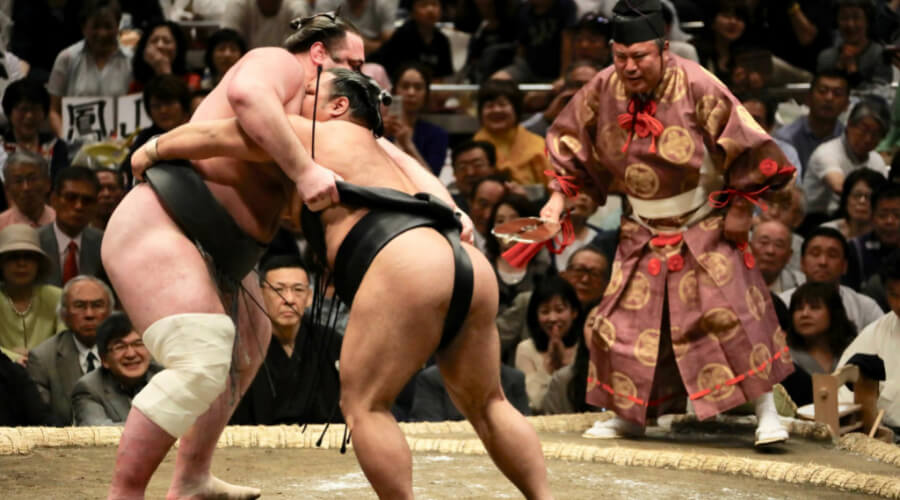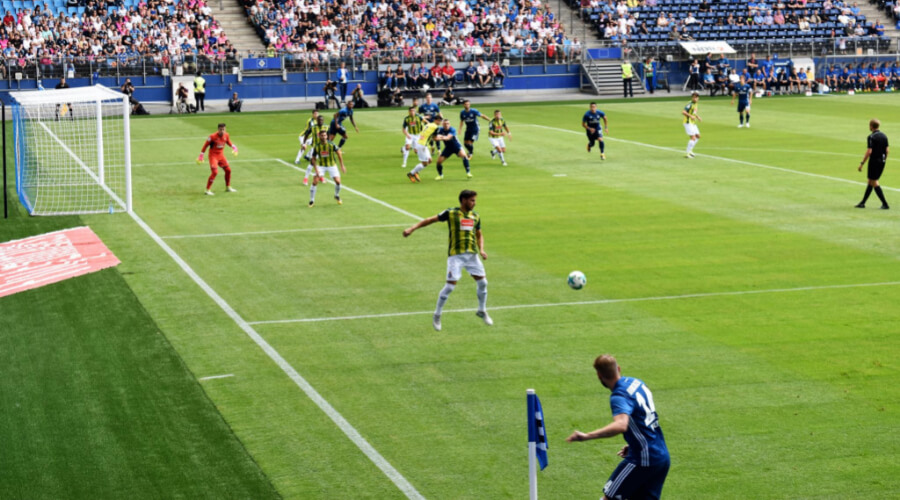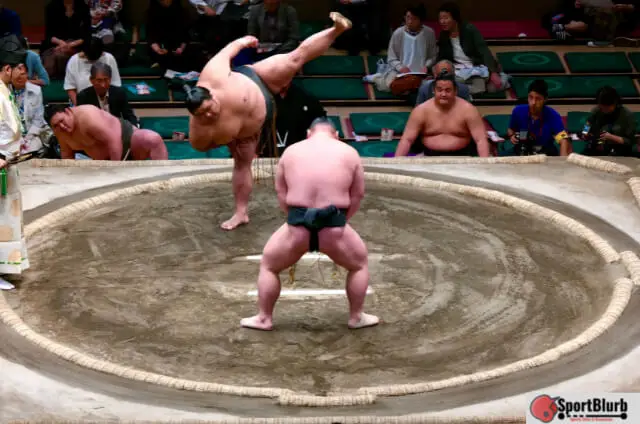Last Updated on October 12, 2023 by Alex PT
There are no sports that are more appropriate for men than for women. Anyone can play any sport they want, regardless of their gender. However, some sports are more traditionally associated with men, such as:
- American football
- Boxing
- Ice hockey
- Rugby
- Wrestling
What Sports Are More Appropriate For Men?
1. Sumo Wrestling

Although this isn’t a sport that is popular everywhere around the world, it is viewed as a man’s sport. It is very popular in some parts of Africa and mainly in Japan. This sport is not just played by men, it is played by heavyweight men. Every player has to weigh a certain amount of pounds because it involves a lot of physical force and one player has to be down or taken out of the designated circle for him to lose. Imagine a small-bodied man playing this game, he would be crushed before he knows what is going on. A woman playing it would be bizarre.
2. Golf
Golf is not like every other sport, it doesn’t involve any of the hardship or dirt of other sports, but it is what we call a real man’s game. It is a game for gentlemen. Going to the golf course and seeing a woman with the golf club trying to hit the ball is an image that would amaze anyone. This isn’t because of any gender inequality but women are not patient for a sport like this. Also, men play golf because it is a time to chill with their friends, have a couple of drinks, and talk about business. Men just do this to get away from the house sometimes. Gold is a man’s game, no one can say otherwise.
3. Soccer

Soccer is also an appropriate man sport, it is not that brutal because it has rules, and also nowadays, soccer leagues now include the women league too. Women can play any sport that a man can, but some sport is just men’s sport. First of all, every player on a soccer field has to run back and forth for at least 30 to 40 minutes in every game. Women can be fit enough to run like that but then there is the issue of the period and other things too. Also, imagine hitting a free-kick and it goes straight to hit the lady on the pitch. I am talking about hard shots like the ones Ronaldo takes. This is a game that everyone can play, but to be very honest, the whole stress doesn’t suit everyone.
4. Motocross
Car racing, not everyone enjoys even watching car racing, sometimes it is too brutal for some people, for most men we get excited when we see our favorite car racer hit another car racer down and his car tumbles. This is a man sport because it takes a lot of gut to drive a car at 180mph and still try to hit your opponent away from your track. This is a crazy man’s game, we must admit because they go nuts on the tracks. The bad side of this game is that they don’t even make enough like other sports, they don’t have enough protection, they could die on the tracks or get terribly injured anytime. This doesn’t even make them stars, most of them walk around and no one knows them. This is a man game because not everyone would manage to not hesitate when they see someone get hurt.
5. Rugby
A sport with many casualties, the game is so wild that, unlike football where they have to take the ball from you, players here just attack you so that you could get away from the ball. It is very rough on a Rugby field because everyone is getting hit by numerous opponents while trying to get the ball across. People dive into you like stray bullets, you are unable to even hold the ball for too long because when they get you on the ground, your team members and the opponents are all on top of you fighting for the ball. You would have to be a very strong man to withstand something like this.
6. Hockey
Hockey players should be the strongest players at heart, every team member is willing to dive in front of a hockey puck coming in like a bullet just so that their opponent doesn’t score. You have to be The Rambo to do something like this. These people lose their teeth, get injured, and all kinds of physical damage, but they still play the game. They have no respect whatsoever for their body, they just want to make sure they don’t lose a match even if they lose a tooth or two. Someone who backs out from things and loves their body a lot would never opt to play hockey.
7. Boxing
Boxing is another real men’s game because not even every man would agree to be a boxer. These people go through serious hospitalization after every match. Most times they have brain damage, broken ribs, fractured jaws, and all of that, they still come in for the next fight. As long as you are playing someone as good as you are, if you win or not, you are getting medical care for weeks.
Reasons for Gender Differences in Sport
Gender differences in sports are influenced by various factors, including societal, physiological, and cultural aspects. Here are the key reasons for these differences in detail:
- Physiological Differences:
- Hormonal Variances: Men generally have higher levels of testosterone, which can contribute to greater muscle mass and physical strength.
- Muscle Composition: Women tend to have a higher percentage of slow-twitch muscle fibers, which are more suited to endurance activities, while men often have more fast-twitch fibers, which favor explosive power.
- Cardiovascular Variations: Men often have larger hearts and lungs, potentially resulting in better aerobic capacity.
- Biomechanical Factors:
- Body Composition: Men typically have a higher percentage of lean body mass, which can affect speed and power in certain sports.
- Center of Mass: Men may have a lower center of mass, providing stability and balance advantages in activities like lifting and throwing.
- Cultural and Societal Influences:
- Historical Norms: Traditional gender roles have historically limited women’s involvement in certain sports. Cultural norms can perpetuate these biases.
- Media and Sponsorship: Disparities in media coverage and sponsorships can affect the visibility and funding of men’s and women’s sports.
- Access to Facilities: Gender disparities in sports facilities and opportunities can hinder female participation and development.
- Psychological Factors:
- Self-Perception: Gender stereotypes can affect individuals’ self-perception and confidence in sports, potentially influencing sports choices.
- Social Support: Lack of encouragement and support for women in sports can impact their participation and progression.
- Policy and Governance:
- Title IX and Equal Opportunities: Legislation like Title IX in the United States has promoted gender equity in educational sports programs, but disparities still exist in many regions.
- Cultural Norms and Traditions:
- Sports Traditions: Some sports have strong gender traditions, making it more challenging for individuals to break into non-traditional roles.
- Coaching and Mentorship:
- Availability of Role Models: Women may have fewer female coaches and mentors, impacting their representation and support in sports.
- Economic Disparities:
- Income Discrepancies: Gender pay gaps in professional sports can deter women from pursuing a career in sports.
- Age and Youth Development:
- Early Exposure: Gender differences can arise in youth sports due to early specialization and exposure, affecting long-term development and preferences.
- Medical and Ethical Considerations:
- Health and Safety: Sports organizations must consider gender-specific health and safety concerns, like injury risks and competitive fairness.
The Scientific Reason Men Like Sports More Than Women
- Biological Factors:
- Hormonal Influences: Some researchers have suggested that testosterone, a hormone more prevalent in men, may play a role in increased competitiveness and attraction to competitive sports.
- Evolutionary Perspective: Evolutionary psychology posits that males may have developed a greater interest in physical competition due to their historical roles as hunters and protectors.
- Socialization and Cultural Factors:
- Upbringing and Social Conditioning: Societal norms often encourage different activities and interests in boys and girls from a young age. Boys might receive more exposure and encouragement in sports.
- Media Representation: Sports media often heavily favor male athletes and male-centric narratives, potentially influencing preferences.
- Peer and Family Influence:
- Peer Group Dynamics: Boys’ peer groups may prioritize sports, fostering a sense of belonging and shared interests.
- Family Support: Families can play a significant role. If parents are sports enthusiasts or encourage their children’s sports participation, it can influence their interests.
- Psychological Factors:
- Self-Efficacy and Confidence: Gender stereotypes can affect self-efficacy, with some women feeling less confident in their sports knowledge, which may impact their interest.
- Cognitive Styles: Some suggest men might have a stronger preference for analytical or rule-based thinking, which can align with sports.
- Economic and Opportunity Disparities:
- Professional Aspirations: In many sports, there are substantial gender pay gaps, which may deter women from pursuing sports-related careers.
- Opportunities and Facilities: Unequal access to sports facilities and opportunities can affect interest and participation.
- Historical Traditions and Norms:
- Long-standing Traditions: Many sports have been historically male-dominated, and these traditions can perpetuate gender disparities in interest and participation.
Conclusion
These sports are only appropriate for men, this doesn’t mean that women can never play. They are just better off when played by men.
References:
https://www.quora.com/Do-you-think-that-there-are-sports-that-are-more-appropriate-for-men

Hi! I’m Alex PT. I hold a Bachelor’s degree in Sports Management from Indiana University and have over seven years of valuable experience working in a Sports Event Management Company. I founded SportBlurb with the passion for bringing you the latest, most insightful, and engaging content in the world of sports. So, whether you’re a die-hard fan or want to stay informed, I’ve got you covered!

